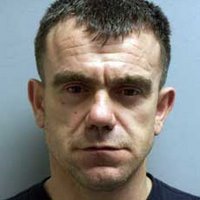MARKO BOSKIC: SREBRENICA MURDERER (new update)
Brief intro by Blog's owner: Marko Boskic allegedly helped kill 12-hundred men and children at Srebrenica, where over eight-thousand Bosniaks were murdered during Srebrenica massacre in 1995. The killings were part of ethnic cleansing by Serb separatists and was the largest massacre in Europe since World War Two. Boskic had been living in Peabody and working as a construction worker when he was arrested last year. Jury selection took place Monday in U-S District Court in Boston. Boskic faces deportation back to Bosnia-Herzegovina, where he could be tried as a war criminal.
 Marko Boskic, a Bosnian immigrant living in Peabody, kept a gruesome secret from US government officials who accepted him as a refugee from the war-torn Balkans, prosecutors said yesterday.
Marko Boskic, a Bosnian immigrant living in Peabody, kept a gruesome secret from US government officials who accepted him as a refugee from the war-torn Balkans, prosecutors said yesterday.The local construction worker was formerly a soldier in the Serbian military's 10th Sabotage Detachment, which forced 1,200 Muslim [Bosniak] men and boys onto buses, unloaded them on a farm outside Srebrenica, lined them up in groups of 10, and shot them as part of a horrific campaign of "ethnic cleansing" in Bosnia in the 1990s, prosecutors said on the opening day of Boskic's trial in US District Court in Boston.
Boskic, 41, was charged in 2004 with five counts of lying to federal officials and concealing his role in the 10th Sabotage unit on the portion of the US immigration form that asks whether he had ever persecuted anyone on the basis of their religion or ethnicity. If convicted, he could face prison and deportation.
But his defense lawyer, Max D. Stern of Boston, told the jury yesterday that Boskic, an ethnic Croat and Roman Catholic, was also a victim of the bloody events that took place in Bosnia in the 1990s.
Stern told the 12 jurors that Boskic was arrested after helping family members flee and was held by the Serbian Army in a concentration camp for six months. He was released only on the condition that he join the 10th Sabotage Detachment, Stern said. When Boskic refused to participate in the massacre, a commander threatened to kill him.
"He did it because a gun was put to his head and he was told, 'You do it or you will be shot,' "
Stern said. "This is not a war crimes case. This is a case about false statements."
In opening statements, Assistant US Attorney Jeffrey Auerhahn described in grisly detail the massacre of over 1,000 Muslims at Branjevo farm in 1995. Less than a handful survived, he said.
Through a Serbo-Croatian interpreter, Becir Salihovic, a survivor now living in Milwaukee, told jurors that on July 11, 1995, he was ordered to leave his home in Srebrenica, which had been overrun by the Serbs. He and other Muslim men and boys were later herded onto buses and from the windows saw a horrifying scene: empty shells from automatic rifles, and dead bodies, he said.
On July 16, Salihovic's hands were tied behind his back, he recalled.
He was loaded on the second of three buses filled with Muslims.
The buses soon stopped at a farm filled with dead bodies, he said, and the soldiers started lining up the men in groups of 10 and shooting them.
"We were holding onto each other," he said. "I was holding the T-shirt of the guy behind me. They told us to put our heads on the backs of the other guy. I was put in a line right in front of the dead bodies."
And then the Serbs started shooting, he said.
"I fell down on the field and a dead guy fell on my back," he said.
The Serbs then started shooting some of the wounded, including Salihovic, to make sure they were dead.
Luckily, the bullet passed through his clothes under his armpit, he said.
He lay still under the corpses until the next morning, he said. "I was crawling through the dead bodies," he said, until Serb soldiers caught sight of him and he ran.
Salihovic found refuge under a bridge, he said, and he met other survivors. But on July 26, 1995, he was caught by the Serbian army and brought to the same concentration camp where Boskic said he was held months earlier. Salihovic spent five months there before he was exchanged for Serbian prisoners, he said. He was reunited with his family and immigrated to the United States in 2001.
Salihovic was not asked to identify Boskic during testimony.
Related:
1. Butcher of Srebrenica wants his own admission kept silent
2. Elusive Justice: Marko Boskic, a man who gunned down 1,200 Srebrenica Bosniaks
3. Bush administration has no interest in prosecuting Srebrenica massacre suspects
4. Phoenix: Mecca for Srebrenica massacre fugitives


<< Home